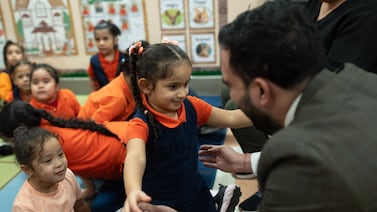Sign up for Chalkbeat Colorado’s free daily newsletter to get the latest reporting from us, plus curated news from other Colorado outlets, delivered to your inbox.
Colorado’s popular universal preschool program has dramatically increased the number of 4-year-olds who get state-funded preschool, but it’s unfolded largely without guardrails to ensure quality.
A report released Tuesday by the National Institute for Early Education Research at Rutgers University highlights these twin realities and provides a more detailed look at where Colorado stands compared to other states.
Overall, the report suggests Colorado has prioritized quantity over quality as it moved from a small tuition-free preschool program for children with certain risk factors to one that’s open to all 4-year-olds. The state’s universal preschool enrollment numbers are impressive, with 70% of eligible children enrolled last year
That number helped Colorado leapfrog from its previous ranking of 27 to third in this year’s “State of Preschool” report. Only Washington, D.C. and Vermont had a larger share of 4-year-olds enrolled in public preschool programs last year.
Leaders at the research institute noted that California added more 4-year-olds to state-funded preschool than Colorado last year — 35,000 compared with 30,000 — but Colorado made far bigger gains than California when it comes to the percentage of children served.
“The progress Colorado made in terms of enrollment and expanding access was pretty remarkable,” said Allison Friedman-Krauss, an associate research professor at the institute.
But Colorado’s showing deteriorated in the quality standards department. In the latest report, it meets only two of 10 benchmarks, down from four in the previous preschool program. The benchmarks, which describe state policies that promote high-quality classrooms, touch on factors such as teacher training, curriculum, and class size.
Colorado officials plan to put new rules governing universal preschool quality in place, but plan to postpone the start date by a year to July 2026. It’s the third time the rules have been delayed.
“They kicked the can down the road one more time,” said W. Steven Barnett, senior co-director of the institute.
Dawn Odean, the state’s universal preschool program director, acknowledged that the state has delayed the rules, but said Barnett’s statement is misleading because Colorado has been working on efforts related to quality for a long time and continues to do so.
She described the state’s approach as “going slow to go fast.”
Colorado leaders repeatedly pledged that universal preschool would provide high-quality classes, starting when they pitched the program to voters, who approved a nicotine tax in 2020 to help fund it.
But currently, the “universal preschool” label doesn’t indicate anything about the caliber of classroom a child will join. Rather, it simply indicates the state is paying for 10 to 30 hours of class time. Of about 2,000 preschools participating in the program, some are excellent and have high state ratings, some are weak and meet only basic health and safety standards, and some are in between.
Experts say high-quality preschool can produce short- and long-term benefits for kids.
In the report, Colorado got credit for meeting two quality benchmarks: having a set of early learning and development standards and providing guidance to preschools on curriculum. While the state has not yet released a list of curriculum approved for use in universal preschool classrooms, that is slated to happen sometime this year.
Texas, Wisconsin, and Indiana are the only other states to hit only two of the institute’s preschool quality benchmarks. More than a dozen states and Washington D.C. meet 9 or 10 of the benchmarks. They include two of Colorado’s neighbors: New Mexico and Oklahoma.
Colorado didn’t meet benchmarks requiring class size caps of 20 and staff-student ratios of 1 to 10. Both limits have prompted heated debate over the last two years. Some private providers have argued they’ll lose money if they have to reduce class sizes below the state’s current cap of 24 and ratios below the current limit of one staff member for every 12 4-year-olds.
By the 2027-28 school year, state officials do plan to require the class size and ratio caps recommended by the research institute for universal preschool. There’s one big exception though: Preschools that have one of the top two state ratings will be allowed to stick with the current caps.
Colorado also didn’t meet benchmarks related to the types of credentials teachers or assistant teachers should have or annual training and coaching for staff.
Lisa Roy, executive director of the Colorado Department of Early Childhood, which administers the universal preschool program, said when Colorado’s rules on preschool quality are fully implemented over the next few years, she anticipates the state will meet at least half of the institute’s benchmarks.
Odean noted that the institute’s 10 benchmarks look at “outputs,” but that Colorado is focused on child outcomes.
“What families tell us consistently, and educators too, is that those outcomes are what’s a priority, and that’s not contemplated in the NIEER ratings,” she said, referring to the institute’s acronym.
The institute’s report describes its benchmarks as “a set of minimum criteria, established by state policy, needed to ensure effectiveness of preschool education programs.”
Barnett said Colorado parents should think carefully before moving their children away from a high-quality program that’s not part of the state’s universal program to a lower-quality provider that is.
“When people did that in Quebec in response to [$10-a-day] child care … kids’ development suffered for a decade,” he said.
Barnett was referring to an effort begun in the 1990s that offered highly discounted child care to Quebec families. While the effort allowed more women to join the workforce, many children were put in low-quality centers. Subsequent studies found negative impacts on children, including increased anxiety and aggression.
A 2019 study that revealed additional negative outcomes as the children became teens and young adults, concluded, “Our findings provide strong support for the argument that the early childhood development environment is a crucial determinant of the long-term success of children.”
Ann Schimke is a senior reporter at Chalkbeat, covering early childhood issues and early literacy. Contact Ann at aschimke@chalkbeat.org





